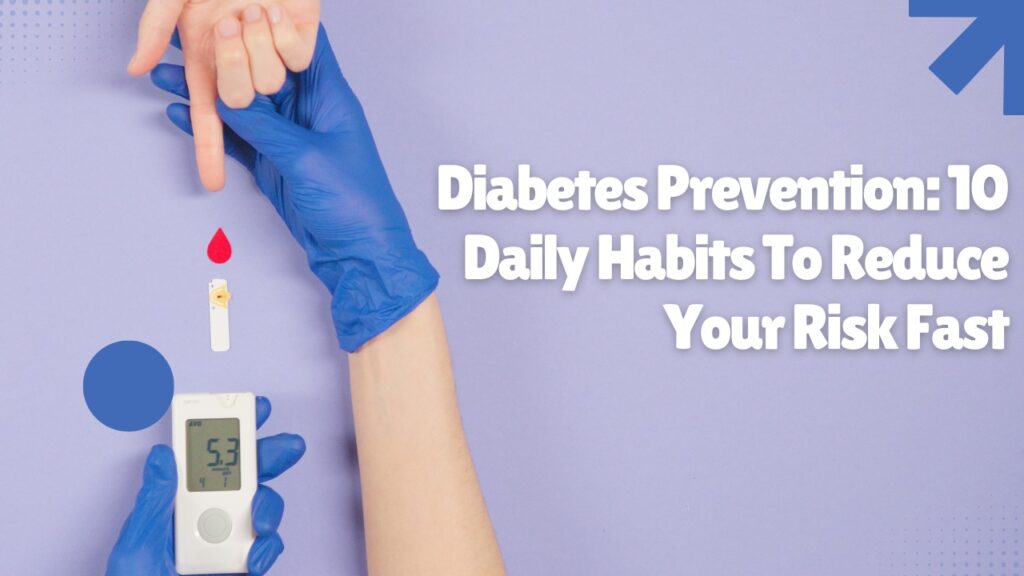Diabetes is rapidly becoming one of the most prevalent chronic diseases globally, with over 537 million adults affected in 2021. This number is expected to rise significantly, making it a major public health issue. What’s even more concerning is that millions of people are prediabetic and unaware of their condition.
The most common type of diabetes, type 2, is largely preventable. This form of diabetes occurs when the body becomes resistant to insulin or when the pancreas doesn’t produce enough insulin. Understanding how the disease develops and its impact on the body is crucial to preventing it.
Fortunately, adopting healthy lifestyle habits can greatly reduce the risk of developing type 2 diabetes. Regular exercise, a balanced diet, maintaining a healthy weight, and managing stress are all effective ways to lower the risk. Early prevention and awareness can make a significant difference in combating the rising diabetes epidemic worldwide.
What is Diabetes ?

Diabetes mellitus is a long-term condition that impacts how your body manages blood glucose, or blood sugar. Glucose is a vital source of energy for your cells, and when this process is disrupted, it can lead to a variety of health problems.
In a healthy body, insulin helps regulate glucose levels by allowing it to enter cells. However, in people with diabetes, either the body doesn’t produce enough insulin, or the cells become resistant to it. As a result, glucose builds up in the bloodstream, leading to high blood sugar levels.
There are two main types of diabetes: type 1 and type 2. Type 1 diabetes occurs when the body’s immune system mistakenly attacks insulin-producing cells in the pancreas. Type 2 diabetes, the more common form, happens when the body doesn’t use insulin properly, leading to insulin resistance.
Managing diabetes involves monitoring blood sugar levels, adopting a healthy diet, and staying active. With proper treatment and lifestyle changes, individuals with diabetes can lead healthy lives and manage their condition effectively. Early diagnosis and prevention are key to reducing the risks associated with diabetes.
There are three main types of diabetes:
Type 1 Diabetes: Type 1 diabetes is an autoimmune condition where the body’s immune system mistakenly attacks and destroys the insulin-producing beta cells in the pancreas. This results in little to no insulin production, making it difficult for the body to regulate blood sugar levels. Type 1 diabetes is usually diagnosed in children or young adults and requires lifelong insulin therapy to manage blood sugar. People with this type of diabetes must carefully monitor their blood sugar levels and inject insulin to stay healthy.
Type 2 Diabetes: Type 2 diabetes is the most common form of diabetes and occurs when the body either becomes resistant to insulin or doesn’t produce enough insulin to meet the body’s needs. This results in elevated blood sugar levels. Type 2 diabetes is strongly linked to lifestyle factors, including poor diet, physical inactivity, and obesity. It is more commonly seen in adults but is increasingly being diagnosed in younger individuals. Early intervention, including lifestyle changes like diet and exercise, can help manage or even reverse type 2 diabetes.
Gestational Diabetes: Gestational diabetes develops during pregnancy when the body cannot produce enough insulin to meet the increased demands. It typically resolves after childbirth, but women who experience gestational diabetes are at a higher risk of developing type 2 diabetes later in life. Proper management during pregnancy is essential to protect both the mother and the baby, and lifestyle changes may be recommended to reduce future risk.
The Effects of Diabetes on the Body
Chronic high blood sugar levels can lead to serious health complications. Here’s how diabetes affects different parts of the body:
Heart and Blood Vessels
Diabetes significantly raises the risk of heart disease and stroke due to its effect on blood vessels. High blood sugar can contribute to high blood pressure, poor circulation, and a condition called atherosclerosis, where the arteries narrow and harden. These changes make it harder for blood to flow properly, increasing the likelihood of cardiovascular problems. Managing blood sugar levels through proper diabetes prevention can help reduce these risks and support heart health.
Eyes (Diabetic Retinopathy)
When blood glucose levels remain high for extended periods, they can damage the small blood vessels in the retina, which may lead to vision problems such as blurry vision or even blindness if untreated. This condition, known as diabetic retinopathy, is a common complication of diabetes. Early detection through regular eye exams and effective diabetes prevention can help protect vision and prevent severe eye damage.
Kidneys (Diabetic Nephropathy)
Diabetes can gradually harm the kidneys’ ability to filter waste from the blood, leading to a condition called diabetic nephropathy. Over time, this damage can progress to kidney failure, making dialysis or even a kidney transplant necessary. Proper diabetes prevention strategies, including blood sugar control, can reduce the risk of kidney complications and help maintain kidney function.

Nerves (Diabetic Neuropathy)
High blood sugar levels can cause nerve damage, resulting in symptoms such as numbness, tingling, pain, and weakness, especially in the hands and feet. This condition, known as diabetic neuropathy, can also make individuals more prone to unnoticed injuries and infections. Effective diabetes prevention practices, such as regular foot checks and blood sugar management, can help reduce nerve damage and maintain nerve health.
Skin
People with diabetes are more vulnerable to skin problems, including bacterial and fungal infections, dry skin, and slow wound healing. High blood sugar levels weaken the body’s ability to fight infections, making it important for individuals with diabetes to manage their condition effectively. Diabetes prevention can help maintain healthy skin and reduce the risk of skin complications.
Feet
Poor circulation and nerve damage caused by diabetes can increase the risk of foot ulcers and infections. In severe cases, these issues may lead to amputations. Proper diabetes prevention, including managing blood sugar and monitoring foot health, can help prevent these serious complications and keep feet healthy.
Mental Health
Living with a chronic condition like diabetes can have an impact on mental health. The constant management required to control blood sugar levels can lead to stress, anxiety, and depression. Seeking support and focusing on diabetes prevention through lifestyle changes can help ease the mental strain and improve overall well-being. Managing diabetes effectively is not just about physical health but also mental health.
Top 10 Diabetes Prevention Habits
Now that we understand the risks, let’s focus on prevention. These 10 science-backed lifestyle habits can dramatically reduce the risk of developing type 2 diabetes and improve overall health.
Maintain a Healthy Weight
Being overweight, particularly when excess fat is stored around the abdomen, is a significant risk factor for type 2 diabetes. Abdominal fat has been linked to higher levels of insulin resistance, which is the primary cause of the disease. Insulin resistance occurs when the body’s cells no longer respond effectively to insulin, leading to higher blood sugar levels.

Excess fat around the abdomen can release fatty acids into the bloodstream, which interfere with the body’s ability to use insulin properly. Over time, this can cause the pancreas to produce more insulin, but the body still struggles to regulate blood sugar levels.
Diabetes prevention is crucial for those with excess weight, especially around the midsection. Adopting a healthy diet, increasing physical activity, and losing weight can reduce insulin resistance, lower the risk of developing type 2 diabetes, and promote better overall health.
Tips:
Aim for a body mass index (BMI) of 18.5 to 24.9.
Even losing just 5–7% of your body weight can significantly reduce diabetes risk.
Track your waist circumference: ideally below 35 inches for women and 40 inches for men.
Adopt a Balanced Diet Rich in Whole Foods
A healthy diet plays a crucial role in diabetes prevention. Eating the right foods can help maintain stable blood sugar levels and improve the body’s ability to use insulin effectively. This reduces the risk of developing type 2 diabetes.
Include high-fiber foods such as whole grains, legumes, and vegetables in your meals. These foods help slow down the absorption of sugar, preventing spikes in blood glucose levels. Additionally, healthy fats from sources like avocados, nuts, and olive oil can support insulin sensitivity.
Choose lean protein sources like fish, chicken, and plant-based proteins to avoid excess fat intake. Avoid sugary drinks and processed foods, which can cause rapid blood sugar increases. By focusing on balanced meals with whole, nutritious foods, you support long-term diabetes prevention.
Eat More Of:
Whole grains (brown rice, oats, quinoa)
Non-starchy vegetables (broccoli, spinach, peppers)
Legumes (beans, lentils)
Nuts and seeds
Lean protein (fish, chicken, tofu)
Limit Or Avoid:
Refined carbs and sugar (white bread, pastries, soda)
Red and processed meats
Fried and fast foods
Sweetened beverages
Pro Tip: Follow the Mediterranean diet or DASH diet, both proven to reduce diabetes risk.
Exercise Regularly
Physical activity plays a vital role in diabetes prevention by enhancing the body’s ability to use insulin. When you engage in regular exercise, your cells become more responsive to insulin. This makes it easier for your body to manage blood sugar levels effectively.

The process involves improving insulin sensitivity, which means your cells are better able to absorb glucose from the bloodstream. This reduces the strain on the pancreas, allowing it to produce insulin more efficiently.
Furthermore, consistent physical activity helps in weight management, which is another key factor in preventing diabetes. By staying active, you can reduce the risk of developing insulin resistance, a condition that often leads to type 2 diabetes. Including exercise in your routine is an essential step for long-term health and diabetes prevention.
Recommendations:
At least 150 minutes of moderate aerobic activity per week (e.g., brisk walking, swimming, cycling)
Include strength training 2–3 times per week
Avoid long periods of sitting — take breaks to stand or move every 30 minutes
Bonus: Exercise also supports weight loss, reduces blood pressure, and boosts mental health.
Drink Water as Your Main Beverage
Sugary drinks, including soda and energy drinks, can significantly spike blood sugar levels, increasing the risk of developing diabetes. These beverages are often loaded with added sugars, which can quickly raise glucose levels in the bloodstream.
Even fruit juices, which are commonly considered healthy, can be packed with sugar. Despite their natural origin, many fruit juices contain high amounts of sugar and lack the fiber found in whole fruits, which can contribute to blood sugar spikes.
For effective diabetes prevention, it’s important to be mindful of the drinks you consume. Choosing water, unsweetened teas, or other low-sugar beverages can help regulate blood sugar levels and reduce the risk of developing insulin resistance or type 2 diabetes. Avoiding sugary drinks is a simple but powerful step toward better long-term health.
Why Choose Water:
Calorie-free
Supports hydration and kidney health
Helps regulate hunger and metabolism
Tip: Add slices of lemon, cucumber, or mint to make water more appealing.
Quit Smoking
Smokers face a significantly higher risk of developing type 2 diabetes, with studies showing they are 30–40% more likely to be affected than non-smokers. Smoking has harmful effects on the body, particularly when it comes to managing blood sugar levels.

Nicotine, a key ingredient in cigarettes, negatively impacts insulin sensitivity. This makes it harder for the body to use insulin effectively, leading to higher blood sugar levels. Over time, this can contribute to insulin resistance, a key factor in the development of diabetes.
Additionally, smoking worsens inflammation and alters fat distribution in the body, which further increases the risk of diabetes. For effective diabetes prevention, quitting smoking can help improve insulin sensitivity, reduce inflammation, and promote healthier fat distribution. This simple step can significantly lower the risk of developing type 2 diabetes.
Benefits of Quitting:
Improved circulation
Lower blood sugar levels
Reduced risk of heart and kidney disease
Support is key: consider nicotine replacement therapy, counseling, or joining a support group.
Limit Alcohol Consumption
Moderate alcohol consumption has been linked to some heart benefits, but excessive drinking can have negative effects on your health, particularly in terms of blood sugar. Drinking too much alcohol can lead to spikes in blood sugar levels, making it harder to manage glucose effectively.
In addition to affecting blood sugar, heavy alcohol consumption contributes to weight gain. Alcohol is high in calories and can lead to overeating or poor dietary choices, which can increase the risk of developing insulin resistance.
For effective diabetes prevention, it’s important to consume alcohol in moderation, if at all. Limiting alcohol intake can help maintain healthy blood sugar levels and support weight management, both of which are key factors in preventing type 2 diabetes.
Guidelines:
Up to one drink per day for women
Up to two drinks per day for men
Choose options with lower sugar and carb content, and always drink with food to slow absorption.
Manage Stress Effectively

Chronic stress can have a significant impact on blood sugar levels, as it triggers the release of stress hormones like cortisol and adrenaline. These hormones can cause an increase in blood sugar, making it harder for the body to maintain healthy glucose levels.
Over time, prolonged stress can lead to insulin resistance, a key factor in the development of type 2 diabetes. Stress-induced blood sugar spikes can also make it difficult to manage weight, further increasing the risk of diabetes.
Additionally, stress often leads to unhealthy eating habits, such as cravings for sugary or high-fat foods. These choices can further contribute to weight gain and blood sugar imbalances. For effective diabetes prevention, managing stress through relaxation techniques, exercise, and a balanced lifestyle is essential to keep blood sugar levels in check and reduce the risk of developing diabetes.
Stress Management Techniques:
Meditation and deep breathing
Yoga or tai chi
Journaling or creative hobbies
Spending time in nature
Getting quality sleep
Mental health is just as important as physical health in preventing chronic disease.
Get Regular Checkups and Screenings
Early detection of prediabetes is crucial for diabetes prevention, as it can significantly reduce the risk of developing type 2 diabetes. Many individuals with prediabetes may not show any noticeable symptoms, making it harder to recognize the condition without proper screening.
Despite the lack of symptoms, people with prediabetes are still at a high risk of developing diabetes. Without intervention, prediabetes can progress to full-blown type 2 diabetes, leading to serious health complications.
Regular check-ups and blood sugar testing are important steps in detecting prediabetes early. If caught in time, lifestyle changes such as a healthier diet and increased physical activity can help reverse the condition and prevent diabetes from developing. Early detection and action are key to successful diabetes prevention and maintaining overall health.
Ask Your Doctor To Check:
Fasting blood glucose
Hemoglobin A1c
Blood pressure
Cholesterol levels
Discuss your family history and risk factors. Annual screenings are especially important after age 45 or earlier if you’re overweight or have other risk factors.
Prioritize Quality Sleep

Poor sleep can have a significant impact on how your body uses insulin, which plays a critical role in managing blood sugar levels. Inadequate sleep can lead to insulin resistance, making it harder for your body to regulate glucose effectively.
People who sleep less than six hours a night are at a higher risk of developing type 2 diabetes. Chronic sleep deprivation disrupts the body’s ability to manage blood sugar and increases the likelihood of developing conditions like obesity and high blood pressure, which are linked to diabetes.
For effective diabetes prevention, prioritizing good sleep is essential. Aim for seven to eight hours of sleep per night to help maintain proper insulin function, support blood sugar regulation, and reduce the risk of developing diabetes. Proper rest is a vital component of a healthy lifestyle and diabetes prevention strategy.
Tips for Better Sleep:
Aim for 7–9 hours per night
Stick to a consistent bedtime and wake-up time
Limit screen time before bed
Keep your room cool, dark, and quiet
If you have sleep apnea or insomnia, seek medical advice — these conditions are closely linked with diabetes risk.
Bonus Tip: Educate Yourself and Others
Knowledge truly is power, especially when it comes to your health. The more you learn about diabetes and how it affects the body, the more confident you’ll feel in making healthy choices. Understanding the risks, warning signs, and lifestyle factors involved plays a big part in staying ahead of the disease.
By becoming informed, you can take smart steps toward diabetes prevention. Small changes like eating better, staying active, and managing stress can make a big difference. Awareness also helps you recognize early signs in yourself or others, giving you the chance to act before it becomes serious.
Don’t keep this information to yourself. Share what you’ve learned with family and friends. You never know who might be at risk without realizing it. Sometimes, a simple conversation can lead someone to get tested or adopt healthier habits. Spreading knowledge can help others stay safe and support a community focused on diabetes prevention and long-term well-being.
Conclusion

In conclusion, taking steps to understand and manage your health can greatly reduce the risk of developing type 2 diabetes. Awareness is the first step toward making better lifestyle choices that support healthy blood sugar levels and overall well-being.
Diabetes prevention involves daily habits such as eating balanced meals, staying physically active, getting enough sleep, and managing stress. These small changes, when practiced consistently, can make a big difference in lowering your risk. Avoiding harmful habits like smoking and limiting sugary drinks also supports better blood sugar control.
Most importantly, share what you learn about diabetes prevention with others. Helping family and friends become more aware can protect their health too. With early action and consistent effort, it’s possible to stay ahead of diabetes and lead a healthier, more balanced life. Prevention is not only possible—it’s powerful.
FAQs
- What is diabetes prevention ?
Diabetes prevention refers to steps you can take to reduce the risk of developing type 2 diabetes through healthy lifestyle choices like diet, exercise, and regular health checkups. - Can diabetes be prevented completely ?
While type 1 diabetes can’t be prevented, type 2 diabetes can often be delayed or avoided by staying active, maintaining a healthy weight, and eating a balanced diet. - How does exercise help in diabetes prevention ?
Exercise helps your body use insulin more effectively, which keeps blood sugar levels stable and reduces the risk of developing insulin resistance. - Are there early signs of diabetes I should watch for ?
Some early signs include frequent thirst, tiredness, increased urination, and blurred vision. However, many people with prediabetes may show no symptoms. - How important is sleep in diabetes prevention ?
Sleep is very important. Poor sleep can affect how your body uses insulin and increase the risk of developing type 2 diabetes.
